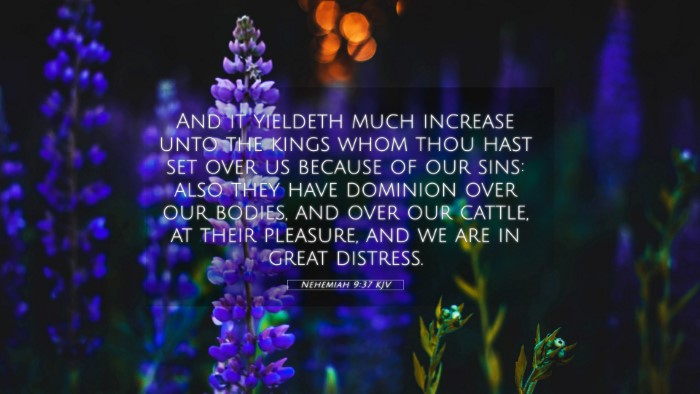Meaning and Interpretation of Nehemiah 9:37
Nehemiah 9:37 (KJV): "And it yieldeth much increase unto the kings whom thou hast set over us because of our sins: also they have dominion over our bodies, and over our cattle at their pleasure, and we are in great distress."
Overview
Nehemiah 9:37 captures the state of distress and bondage experienced by the people of Israel due to their unfaithfulness to God. This verse serves as a reminder of the consequences of sin and the heavy burden of oppression that can follow.
Contextual Background
This verse is part of a larger confession in Nehemiah 9, where the Israelites acknowledge their historical disobedience and the resultant punishment. It reflects on their cycle of sin, repentance, and the mercy of God throughout their history.
Commentary Insights
Insights from Matthew Henry
Matthew Henry points out the unyielding nature of sin and its consequences. In this context, he notes that the Israelites were under oppressive rulers as a direct result of their transgressions. He emphasizes the notion that earthly kings extracted heavy burdens from the people, signifying God's displeasure with their actions.
Insights from Albert Barnes
Albert Barnes elaborates on the concept of "yielding much increase" as it pertains to the servitude imposed by earthly authorities. He reflects on how the failures of the Israelites led to their subjugation, indicating that the blessings of God had been replaced with sorrow and distress due to disobedience.
Insights from Adam Clarke
Adam Clarke highlights the significance of the phrase "great distress," illustrating the deep pain and suffering that arises from turning away from God. He points out that the text encapsulates not just physical burdens but also spiritual desolation that accompanies sin.
Connections to Other Bible Verses
Examining Nehemiah 9:37 in relation to other scriptures provides a deeper understanding of its themes. Here are some relevant cross-references:
- Deuteronomy 28:15-68: Discusses the curses that come with disobedience to God's commandments.
- 2 Chronicles 36:15-16: Chronicles God's repeated warnings to His people before they faced calamity.
- Isaiah 1:4: Expresses the sinful state of Israel and the consequences of their rebellion.
- Jeremiah 5:25: Indicates how sins prevent blessings from coming upon a nation.
- Lamentations 3:39: Questions why the living complain when their sins bring suffering.
- Ezekiel 18:30: Calls for repentance in light of the consequences of sin.
- Romans 6:23: States the wages of sin as death, reinforcing the serious impacts of disobedience.
Thematic Connections
Nehemiah 9:37 contains several thematic connections that resonate throughout scripture:
- Sin and Its Consequences: The biblical narrative consistently illustrates that turning away from God leads to suffering and oppression.
- The Role of Leadership: The verse reflects on how leadership impacts the common people, reiterating the responsibility of rulers.
- Repentance and Restoration: The overarching message of the Israelites' journey calls for a return to God to break the cycle of sin.
Application for Today
The emotional weight and historical context of Nehemiah 9:37 engage us to reflect on our own lives:
- Recognizing Sin: Acknowledging sin is crucial for spiritual growth and healing.
- Understanding Authority: Evaluating how our leadership choices and societal structures align with biblical principles.
- Seeking Restoration: Striving for a relationship with God that leads to freedom rather than bondage.
Conclusion
Nehemiah 9:37 serves as a poignant reminder of the consequences of sin and the suffering it brings. By examining this verse alongside other biblical texts, we can appreciate its deeper meaning and apply its lessons to our lives. Engaging with the scriptural cross-referencing will enhance our understanding of both the themes presented and the overall narrative of salvation history.
Further Study Suggestions
For those looking to delve deeper into the themes of Nehemiah 9:37 and its connections, consider:
- Exploring tools for Bible cross-referencing to identify further thematic connections.
- Utilizing a Bible concordance to locate related verses efficiently.
- Engaging in a comparative Bible verse analysis to uncover nuances between different scriptural themes.












